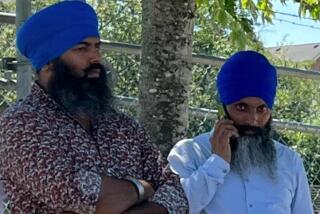FBI stays mostly mum about Sikh temple shooter Wade Page
Two hundred investigative leads, 300 interviews, more than 200 pieces of evidence.
Yet when the Federal Bureau of Investigation announced the results of its expansive investigation into why Wade Michael Page, 40, killed six people at a Sikh temple in Oak Creek, Wis., its perspective on his motives consisted of four sentences.
āThe FBI investigation indicates Wade Michael Page acted alone and was not assisted in committing this violent crime killing six and wounding four other victims,ā the FBIās statement said in November. āNo evidence was uncovered to conclude this attack was directed or facilitated by any white supremacist group. During the shooting at the temple, Page exchanged gunfire with two Oak Creek police officers seriously wounding one, before being shot by another officer, then turning his weapon on himself. There is also no evidence to suggest the attack was part of any ongoing threat to the Sikh community.ā
WHO THEY WERE: Sikh temple shooting victims
The massacre at the Sandy Hook Elementary School in Newtown, Conn., has triggered renewed debate about the causes of mass shootings and discussion about how to prevent further attacks. But the FBI doesnāt plan to release anything more about Page, whose motives would have been examined in a public trial had he not killed himself.
āHe did not leave a note behind,ā Leonard Peace, spokesman for the FBIās Milwaukee office, said Tuesday. āThe investigation did not reveal that he had communicated to anyone his intent to do this. Without any clear motive as to why, you can only speculate what his true motives were in doing this attack. Thatās not what we do. We donāt sit and speculate. We have to base our investigation on finding some facts.ā
Peace said no one could have seen Pageās attack coming. When pressed about particulars -- whether Page had substance-abuse problems or showed any signs of instability -- he said that the FBI would not release more information from its investigation.
TIMELINE: Deadliest U.S. mass shootings
āBottom line is, we spent literally, we spent a great deal of resources,ā Peace said. ā[It was the] highest priority to the FBI to do this investigation, and it was thorough, and it was very methodical in this process to get to the facts. We found that he acted alone, that he was not directed by a white supremacist group, and there is no indication that there is an ongoing threat to the Sikh community.ā
Peace added, āWeāre going to have to leave it at that for now.ā
Amardeep Kaleka, son of temple President Satwant Kaleka -- who reportedly died trying to lunge at Page with a butter knife -- told the Los Angeles Times that many in the Sikh community were ādisappointedā with the investigation.
āThey spent three hours discussing what they found, and it really didnāt amount to anything,ā he said of the FBIās meeting with community members before announcing the conclusion of the investigation. āThe community just sat there and asked questions and was disappointed ā¦ they were left hanging.ā
The Timesā previous reporting on Page yielded an incomplete portrait. His stepmother, Laurie Page, 67, of Denver, described him as a gentle and well-adjusted child who idolized Stevie Ray Vaughan as a guitarist.
Pageās mother had died of Lupus when he was 13. He later joined the Army, landing at Ft. Bragg in Fayetteville, N.C., in 1995. It was a hotbed for neo-Nazis recruiting active service members. Page fell in with white supremacists and eventually fell out of the Army in 1998 after reporting for duty drunk.
In 2000, Page would later say in a promotional interview with a music label for his rage-rock band, āI set out to get involved and wanted to basically start over.ā
Page wandered from Orange County, Calif., to Colorado and back to North Carolina, embedding deeper with the white-power music subculture and accumulating supremacist tattoos. Page lost a job at a Harley-Davidson dealership for not getting along with female co-workers and for arguing with his boss, John Tew, in 2004. By 2005, Page had started a supremacist band called End Apathy that raged against a āsick society.ā
Anti-Defamation League researchers -- who had kept an eye on Page along with law enforcement officials and the Southern Poverty Law Center -- said that Page moved to Wisconsin to be with a girlfriend, Misty Cook, a 31-year-old waitress and nursing student whom the researchers said shared some of Pageās supremacist leanings.
The two shared an apartment with Cookās 5-year-old son, neighbors said, and in June, the couple apparently broke up.
From there, the trail dries up as to why Page attacked the temple, known as a gurdwara. Page stopped going to work in mid-July, according to a recent Southern Poverty Law Center report, and stopped paying his rent.
But when it came to explaining how Page decided to attack the Sikh gurdwara on Aug. 5, the report could only speculate: āItās probably no coincidence that the temple is just down the block from the restaurant where Cook worked. Perhaps the turban-wearing Sikh men caught his eye because of the proximity.ā
Yet racism could not be demonstrated as the reason Page shot up the gurdwara -- nor could it be explained away. Analysts previously told The Times that thereās a strong tradition of supremacist ālone wolvesā who act ambiguously to protect the movement.
ALSO:
āPuppies for Rentā business in Utah sparks criticism
L.A. girls pay tribute in visit, but Newtown is a day of hearses
āNo, no, noā: Harrowing 911 call, then 4 dead near Longmont, Colo.
More to Read
Sign up for Essential California
The most important California stories and recommendations in your inbox every morning.
You may occasionally receive promotional content from the Los Angeles Times.











